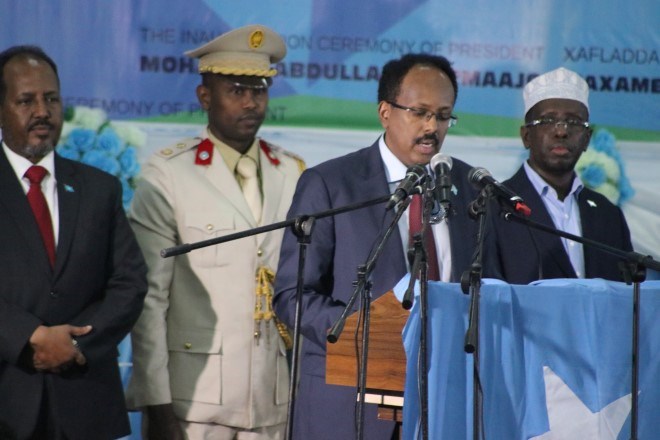Hiiraan Online
Wednesday February 22, 2017
Mogadishu¬ (HOL) – Mohamed Abdullahi Farmajo, - the underdog in what was Somalia’s most hotly contested political campaign – has been inaugurated as Somalia’s 9th President.
President Farmajo was elected on February 8th after pulling away from the incumbent, Hassan Sheikh Mohamud, and former President Shiekh Sharif Sheikh Ahmed in the second round of run-off voting, a feat few predicted.
The inauguration was the biggest in recent years and the hall was filled with foreign dignitaries including neighbouring heads of state, ambassadors and key international partners. All of whom took the podium at one point during the afternoon to offer congratulatory remarks. The Master of Ceremonies for the event was Minister for the Minister of Planning and International Cooperation, Abdirahman Aynte. The events organizers said that representatives from 124 countries were present at the inauguration.
Pledging to return dignity back to his homeland, President Farmajo acknowledged that he is in the beginning of his long journey as his government aims at tackling the looming famine, the perilous security situation, and national reconciliation. He said Somalia’s problems are for Somali’s to fix, and although allies and partners can work in good faith in helping Somalia pull itself up, he specifically called upon Somali’s to solve these problems.
“Beside me are two former presidents, this is a sign of democracy. Now, it’s time to compete with the world.”
After his remarkable electoral victory, thousands of civilians took to the streets in celebration in nearly every corner of Somalia. This unprecedented display of public support came with hopes that the new leader can usher in change for the millions struggling in this beautiful but impoverished nation. An overwhelming majority of the public was tired of the status quo and was elated to see a man they supported be propelled into the nation’s top job. President Farmajo said that his administration hopes to break the cycle of mistrust between the government and its people.
“We will work to take clear steps to restore the public's confidence in the government, serving our people will be the core value of the government…. I will lead by example to empower the rule of law in Somalia.”
He also said that Somalia consistently on the bottom of most corruption and failed states index is something he will work to change.
Created with flickr slideshow.
In the run-up to the inauguration, there have been several incidents involving the militant insurgency group Al-Shabaab and the president used his first official speech to the public as a President to give them a stern warning: 12 million Somali’s cannot be held hostage by 2,000 militants. He offered young people currently fighting in Al-Shabaab, Al-Qaeda and ISIS’ ranks a choice to leave this wayward life and re-join their countrymen as productive citizens because your time is finished.
"To those who work with al Qaeda, al Shabaab and IS (Islamic State), your time is finished … you have been misled, destroyed property and killed many Somalis. Come and we shall give you a good life," he said.
Many were waiting to hear what he would say about the army, an issue that he made a priority as a Prime Minister and a hallmark of his campaign rhetoric. He said that his focus is first to build the capacity of the armed forces, their logistics, build barracks and make sure they receive their monthly stipend on time. Earlier this month he announced that AU troops would remain in the country to assist with the transition. He thanked AMISOM troops for their sacrifice and said Somali’s will always remember.
Among the guests invited to speak was President of Djibouti Ismail Omar Guelleh, President Uhuru Kenyatta of Kenya, Prime Minister Hailemariam Desalegn, UN Special Representative of the Secretary-General for Somalia, Michael Keating, Former Turkish Ambassador to Somalia Kani Torun, AU Special Representative Francisco Madiera, and a representative from the Arab League as well as Sudan. The speakers said a few short words, although many expressed alarm at the humanitarian situation.
Kenyan President Uhuru Kenyatta received a warm welcome from the audience as we approached the podium to speak. He spoke fondly of Somali's calling them his brothers. He congratulated Somalia for the conclusion of a peaceful election and reaffirmed Kenya's commitment to Somalia as the two neighbours continue to fight Al-Shabaab.
"The Somali people have spoken and they have great expectations of the new government in rebuilding and developing the nation," President Uhuru said.
"You, Mr. President also assume office as we face an enormous challenge and we are collaborating to restore regional stability as we face transnational and cross-border crimes and I am confident that God will grant you wisdom to deal with such challenges," the President stated.
After the inauguration, Uhuru Kenyatta had lunch with President Farmajo as well as former President's Hassan Sheikh Mohamud and Sharif Sheikh Ahmed.
The Djibouti president promised that his nation will forever stand side by side with the Somali people. Before the election, the Somali and Djibouti presidents also laid the foundational stone for a new Djibouti embassy in Mogadishu.
President Farmajo takes over the reins at Villa Somalia at a time when the country is facing it's worst humanitarian disaster since 2011 when nearly a quarter of a million people died. Somalia is also struggling to thwart attacks from Al- Shabaab. Late last week, a car bomb ripped through a busy market in Mogadishu killing 39 people and wounding dozens more. President Farmajo visited those victims at Medina Hospital and offered $100K to information that will lead authorities to a bomb.
With the party now over, President Farmajo now must put these ambitious words into action. No President before him enjoyed this much goodwill from the people and his next move, appointing a Prime Minister will be a show of whether Somalia’s new President is serious about ushering in a new era for Somali’s.